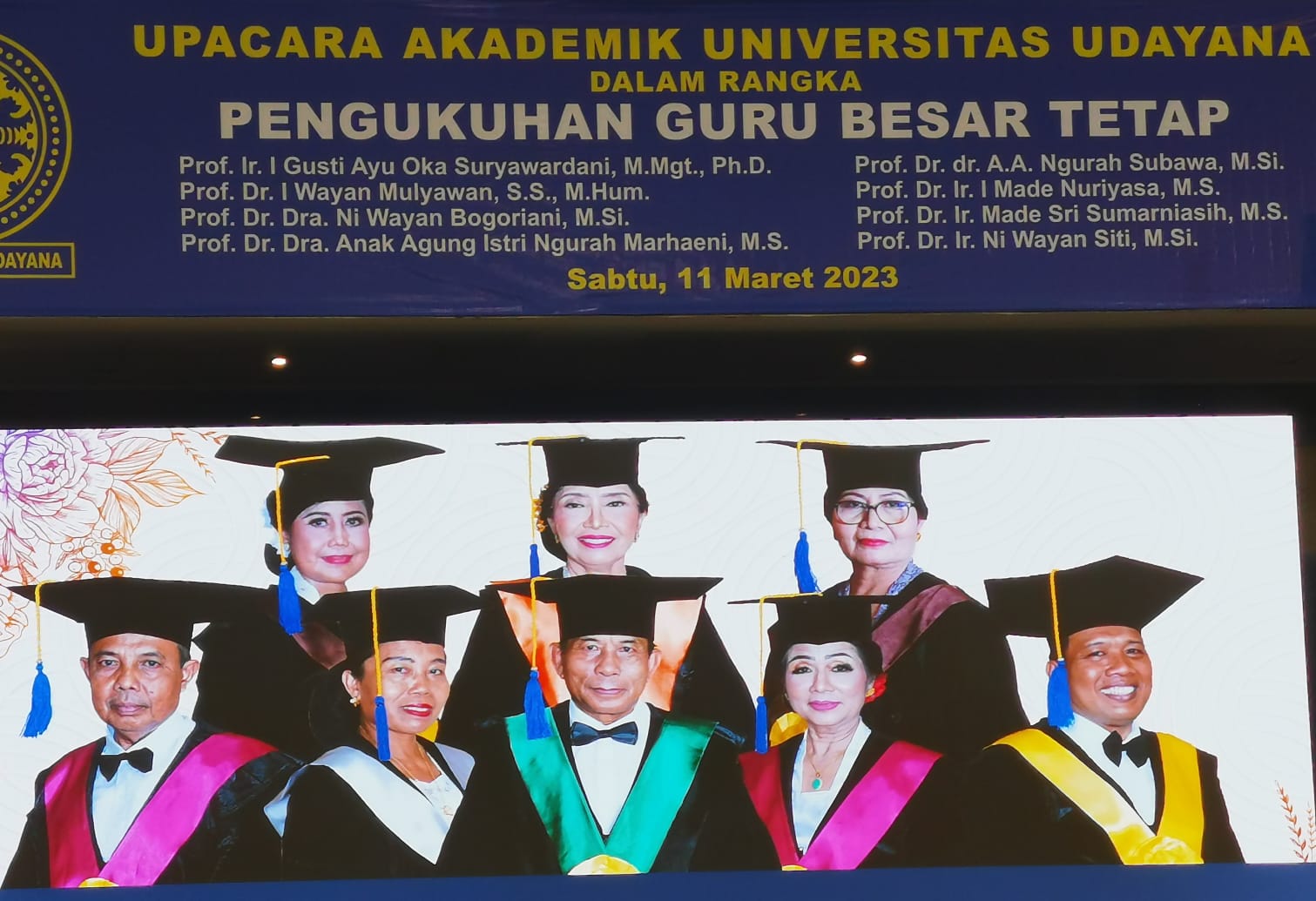Two Srikandis of the Faculty of Agriculture Inaugurated as Permanent Professors of Udayana University
Happy news for the big family of the academic community of the Faculty of Agriculture, Udayana University (FP Unud), Saturday (11/03) two of the heroines were inaugurated as permanent professors. Agribusiness Study Program Lecturer Prof. Ir. I Gusti Agung Oka Suryawardani, M.Mgt., Ph.D was officially announced as a permanent professor in Agribusiness Management, and Lecturer in Agroecotechnology Study Program Prof. Dr. Ir. Made Sri Sumarniasi, M.S. as professor of Soil Science. The inauguration was carried out at the Udayana University senate meeting which was held at the Widyasabha Building, Udayana University Campus Bukit Jimbaran.
Prof. Oka Suryawardani in his scientific oration "Leakage of Bali Tourism from the Priority Strategy Accommodation Sector and Its Implications" highlighted weaknesses in Bali tourism accommodation management which resulted in some of the profits from the tourism business fleeing abroad. "Bali's economy is supported by three main sectors, namely agriculture, industry, and tourism. These three sectors are interrelated which have generated the Balinese economy," said the former Kooprodi S2 Tourism. Furthermore, Prof. Oka Suryawardani emphasized that Industry is a secondary sector that processes agricultural products as a necessity for the tourism sector, for example the handicraft industry and the processing of agricultural products (such as wine and processed agricultural products in cans) which are managed as professional agribusiness.
One of the reasons for tourism leakage, said Prof. Oka Suryawardani, when the agricultural sector is unable to meet the needs of the tourism sector according to the needs of tourists. "This condition causes the tourism sector to import agricultural products and processed products from abroad. Besides that, they also use foreign services to support their operations, this condition will create tourism leakage," he said. The researcher at the Udayana University Tourism Excellence Center explained that the highest leakage was in the management of 4 & 5 star chain hotels (55.3%), followed by the second highest leakage in 4 & 5 star non-chain hotels (15.7%). The third highest leakage is in 1.2 & 3 star hotels (7.1%), and the lowest leakage is in non-star hotels (2.0%).
Meanwhile, Prof. Sumarniasih emphasized dry land conservation efforts to strengthen the contribution of the agricultural sector to economic development. As if it is an alternative solution to the problem of leakage of income in the tourism sector, the role of the agricultural sector is very important, such as a source of food, a source of raw materials, a source of income and a potential market for industrial goods. "The processing of dry land for agriculture aims to create better physical, chemical and biological soil conditions. The main problems in managing dry land vary between regions, both technical and socio-economic aspects," he said.
Dry land has a low fertility rate, said Prof. Sumarniasih, especially on eroded soils, so that the tillage layer becomes thin and the organic matter content is low. This condition is exacerbated by the limited use of organic fertilizers, especially for seasonal food crops. This is overcome by the application of technology, namely (1) soil and water conservation measures, (2) management of soil fertility (lime, fertilization and addition of organic matter, and (3) selection of types of food plants (short-lived drought-resistant plants are the right choice). .
He further explained, dry land in Bali is currently still sufficient, with an area of 262,925 ha but productivity is relatively low. Prof. Sumarniasih recommends, among other things, conservation actions, namely efforts to protect, restore, increase and maintain land functions according to their capabilities and designations, by applying several methods according to local conditions, namely: using varieties tolerant to environmental stress, adjusting cropping patterns, adjusting the proportions of annual and annual plants , technological innovation in water and climate management, soil and water conservation, applying intercropping cropping patterns, evaluating land suitability, evaluating land capability, evaluating soil quality, evaluating erosion hazard, empowering and participating farmers, and strengthening institutions.
The inauguration of the permanent professor was opened by the Chancellor of Udayana University, Prof.Dr.Ir. I Nyoman Gde Antara, M.Eng.IPU. and was attended by members of the Udayana University senate, professors, vice-chancellors and also deans from each faculty. Also present were colleagues from each of the professors who were confirmed to convey happy congratulations. Unud Chancellor Prof. Antara explained that the position of professor was the highest academic position and was achieved for perseverance and tenacity as well as the moral support of various parties. Unud confirmed 8 professors namely Prof. Ir. I Gusti Ayu Oka Suryawardani, M.Mht., Ph.D and Prof. Dr. ir. Made Sri Sumarniasih, MS (FP), 2Prof. Dr. Ir. I Made Nuriyasa, M.S. and Prof. Dr. Ir. Ni Wayan Siti, M.Si (Fapet), Prof. Dr. dr. Ni Wayan Bogorini, M.Sc. (FMIPA), Prof. Dr. dr. Daughter of Agung's wife Ngurah Marhahaeni, M.SI.(FEB), Prof. Dr. I Wayan Mulyawan, S.S., M.hu, (FIB), and Prof. Dr. dr. A A. Ngurah Subawa, M.Sc. (FK). Prof. Between explaining the inauguration of the 8 professors, Unud currently has 193 people. "The opportunity to add professors at Unud is very wide open because the number of lecturers with doctoral degrees with 192 lector positions and 247 head associate professors," he said. It was emphasized that Udayana University currently has 14% of professors from the current total of 1,385 Udayana University lecturers. (*)









